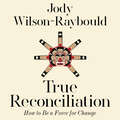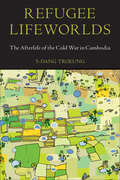Title search results
Showing 1 - 3 of 3 items

True Reconciliation: How to Be a Force for Change
By Jody Wilson-Raybould. 2022
DAISY audio (Direct to player), DAISY audio (Zip)
Politics and government, Indigenous peoples biography, Politics and government biography
Human-narrated audio
From the #1 bestselling author of 'Indian' in the Cabinet, a groundbreaking and accessible roadmap to advancing true reconciliation across…
Canada.There is one question Canadians have asked Jody Wilson-Raybould more than any other: What can I do to help advance reconciliation? This has been true from her time as a leader of British Columbia’s First Nations, as a Member of Parliament, as Minister of Justice and Attorney General, within the business communities she interacts, and when having conversations with people around their kitchen tables. Whether speaking as individuals, communities, organizations, or governments, people want to take concrete and tangible action that will make real change. They just need to know how to get started, or to take the next step. For Wilson-Raybould, what individuals and organizations need to do to advance true reconciliation is self-evident, accessible, and achievable. True Reconciliation is broken down into three core practices—Learn, Understand, and Act—that can be applied by individuals, communities, organizations, and governments. They are based on the historical and contemporary experience of Indigenous peoples in their relentless efforts to effect transformative change and decolonization; and deep understanding and expertise about what has been effective in the past, what we are doing right, and wrong, today, and what our collective future requires. True Reconciliation, ultimately, is about building transformed patterns of just and harmonious relations between Indigenous and non-Indigenous peoples at all levels of society. Throughout the book, the author shares her voice and experience with others who tell their stories. To help with the practices of learning, understanding, and acting, there is a planning guide at the end of the book—to help the reader translate words into action for themselves as individuals, for their communities, organizations, and governments at all levels. The ultimate and achievable goal of True Reconciliation is to break down the silos we've created that prevent meaningful change, to be empowered to increasingly act as ‘inbetweeners,’ and to take full advantage of this moment in our history to positively transform the country into a place we can all be proud of.
True Reconciliation: How to Be a Force for Change
By Jody Wilson-Raybould. 2022
Braille (Contracted), Electronic braille (Contracted), DAISY Audio (Direct to Player), DAISY Audio (Zip), DAISY text (Direct to player), DAISY text (Zip), Word (Zip), ePub (Zip)
Politics and government biography, Politics and government, Indigenous peoples biography
Synthetic audio, Human-transcribed braille
NATIONAL BESTSELLERFrom the #1 bestselling author of 'Indian' in the Cabinet, a groundbreaking and accessible roadmap to advancing true reconciliation…
across Canada.There is one question Canadians have asked Jody Wilson-Raybould more than any other: What can I do to help advance reconciliation? It is clear that people from all over the country want to take concrete and tangible action that will make real change. We just need to know how to get started. This book provides that next step. For Wilson-Raybould, what individuals and organizations need to do to advance true reconciliation is self-evident, accessible, and achievable. True Reconciliation is broken down into three core practices—Learn, Understand, and Act—that can be applied by individuals, communities, organizations, and governments. The practices are based not only on the historical and contemporary experience of Indigenous peoples in their relentless efforts to effect transformative change and decolonization, but also on the deep understanding and expertise about what has been effective in the past, what we are doing right, and wrong, today, and what our collective future requires. Fundamental to a shared way of thinking is an understanding of the Indigenous experience throughout the story of Canada. In a manner that reflects how work is done in the Big House, True Reconciliation features an “oral” history of these lands, told through Indigenous and non-Indigenous voices from our past and present. The ultimate and attainable goal of True Reconciliation is to break down the silos we’ve created that prevent meaningful change, to be empowered to increasingly act as “inbetweeners,” and to take full advantage of this moment in our history to positively transform the country into a place we can all be proud of.
Refugee Lifeworlds: The Afterlife of the Cold War in Cambodia (Asian American History & Cultu)
By Y-Dang Troeung. 2022
Braille (Contracted), Electronic braille (Contracted), DAISY Audio (Direct to Player), DAISY Audio (Zip), DAISY text (Direct to player), DAISY text (Zip), Word (Zip), ePub (Zip)
Asian history, General non-fiction
Synthetic audio, Automated braille
Cambodian history is Cold War history, asserts Y-Dang Troeung in Refugee Lifeworlds. Constructing a genealogy of the afterlife of the Cold…
War in Cambodia, Troeung mines historical archives and family anecdotes to illuminate the refugee experience, and the enduring impact of war, genocide, and displacement in the lives of Cambodian people. Troeung, a child of refugees herself, employs a method of autotheory that melds critical theory, autobiography, and textual analysis to examine the work of contemporary artists, filmmakers, and authors. She references a proverb about the Cambodian kapok tree that speaks to the silences, persecutions, and modes of resistance enacted during the Cambodian Genocide, and highlights various literary texts, artworks, and films that seek to document and preserve Cambodian histories nearly extinguished by the Khmer Rouge regime. Addressing the various artistic responses to prisons and camps, issues of trauma, disability, and aphasia, as well as racism and decolonialism, Refugee Lifeworlds repositions Cambodia within the broader transpacific formation of the Cold War. In doing so, Troeung reframes questions of international complicity and responsibility in ways that implicate us all.